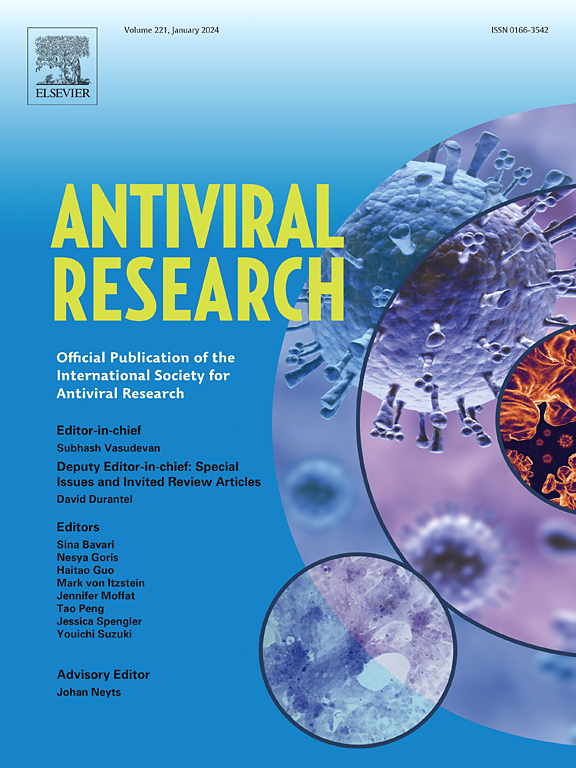维莫非尼抑制致糖尿病肠道病毒在肠上皮细胞和胰腺β细胞中的复制。
IF 4.5
2区 医学
Q1 PHARMACOLOGY & PHARMACY
引用次数: 0
摘要
通过肠道感染的肠道病毒与 1 型糖尿病(T1D)的发病有关。肠道病毒的长期粪便脱落与胰岛自身免疫有关。此外,在新近发病的 T1D 患者的胰岛中也检测到了肠道病毒蛋白和病毒 RNA,这表明它们可能在β细胞破坏中发挥作用。尽管如此,目前还没有获得批准的专门针对肠道病毒感染的抗病毒药物可用于疾病干预。药物再利用允许为现有药物发现新的临床用途,并能加快药物发现。此前,抗癌药物 Vemurafenib 对几种肠道病毒表现出了前所未有的抗病毒活性。在本研究中,我们评估了 Vemurafenib 及其类似物在预防感染或减少与 T1D 相关的肠道病毒复制方面的功效。我们在肠上皮细胞(IECs)和胰岛素分泌β细胞中测试了维莫非尼。此外,我们还制定了感染人类干细胞衍生胰岛(SC-islets)的方案,并在该模型中使用了Vemurafenib及其类似物。我们的研究显示,Vemurafenib 在 IECs 和 beta 细胞系中表现出很强的抗病毒特性。Vemurafenib类似物也具有抗病毒作用。SC小体表达病毒受体CAR和DAF,它们分别在胰岛素阳性细胞和胰高血糖素阳性细胞中的表达量最高。SC-islet 成功感染了 CVB,而且大多数批次的 SC-islet 都证实了 Vemurafenib 及其类似物的抗病毒活性。总之,我们的观察结果表明,Vemurafenib 及其类似物作为治疗肠道病毒引起的疾病(包括 T1D)的潜在抗病毒药物值得进一步探索。本文章由计算机程序翻译,如有差异,请以英文原文为准。
Vemurafenib inhibits the replication of diabetogenic enteroviruses in intestinal epithelial and pancreatic beta cells
Enteroviruses, which infect via the gut, have been implicated in type 1 diabetes (T1D) development. Prolonged faecal shedding of enterovirus has been associated with islet autoimmunity. Additionally, enteroviral proteins and viral RNA have been detected in the pancreatic islets of individuals with recent-onset T1D, implicating their possible role in beta cell destruction. Despite this, no approved antiviral drugs currently exist that specifically target enterovirus infections for utilisation in disease interventions.
Drug repurposing allows for the discovery of new clinical uses for existing drugs and can expedite drug discovery. Previously, the cancer drug Vemurafenib demonstrated unprecedented antiviral activity against several enteroviruses. In the present study, we assessed the efficacy of Vemurafenib and an analogue thereof in preventing infection or reducing the replication of enteroviruses associated with T1D. We tested Vemurafenib in intestinal epithelial cells (IECs) and insulin-producing beta cells. Additionally, we established a protocol for infecting human stem cell-derived islets (SC-islets) and used Vemurafenib and its analogue in this model.
Our studies revealed that Vemurafenib exhibited strong antiviral properties in IECs and a beta cell line. The antiviral effect was also seen with the Vemurafenib analogue. SC-islets expressed the viral receptors CAR and DAF, with their highest expression in insulin- and glucagon-positive cells, respectively. SC-islets were successfully infected by CVBs and the antiviral activity of Vemurafenib and its analogue was confirmed in most SC-islet batches.
In summary, our observations suggest that Vemurafenib and its analogue warrant further exploration as potential antiviral agents for the treatment of enterovirus-induced diseases, including T1D.
求助全文
通过发布文献求助,成功后即可免费获取论文全文。
去求助
来源期刊

Antiviral research
医学-病毒学
CiteScore
17.10
自引率
3.90%
发文量
157
审稿时长
34 days
期刊介绍:
Antiviral Research is a journal that focuses on various aspects of controlling viral infections in both humans and animals. It is a platform for publishing research reports, short communications, review articles, and commentaries. The journal covers a wide range of topics including antiviral drugs, antibodies, and host-response modifiers. These topics encompass their synthesis, in vitro and in vivo testing, as well as mechanisms of action. Additionally, the journal also publishes studies on the development of new or improved vaccines against viral infections in humans. It delves into assessing the safety of drugs and vaccines, tracking the evolution of drug or vaccine-resistant viruses, and developing effective countermeasures. Another area of interest includes the identification and validation of new drug targets. The journal further explores laboratory animal models of viral diseases, investigates the pathogenesis of viral diseases, and examines the mechanisms by which viruses avoid host immune responses.
 求助内容:
求助内容: 应助结果提醒方式:
应助结果提醒方式:


